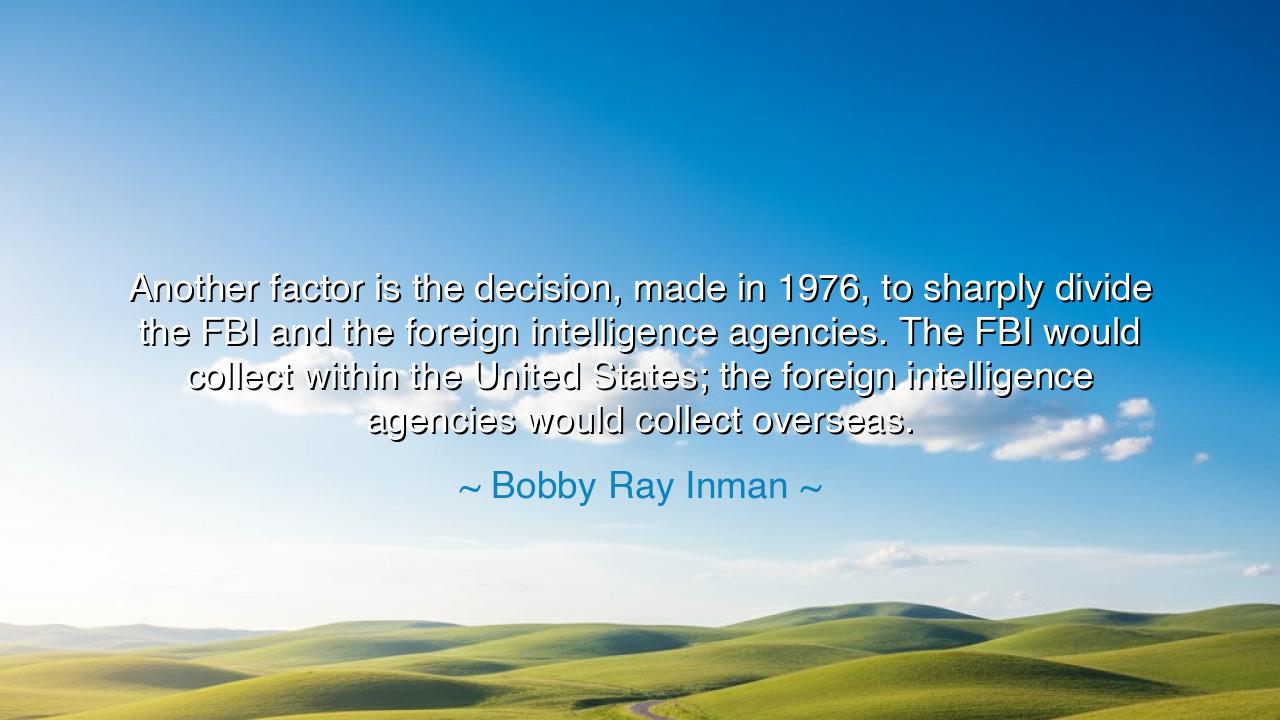
Another factor is the decision, made in 1976, to sharply divide
Another factor is the decision, made in 1976, to sharply divide the FBI and the foreign intelligence agencies. The FBI would collect within the United States; the foreign intelligence agencies would collect overseas.






The words of Bobby Ray Inman, “Another factor is the decision, made in 1976, to sharply divide the FBI and the foreign intelligence agencies. The FBI would collect within the United States; the foreign intelligence agencies would collect overseas,” rise from the annals of modern history like the sound of a great bell tolling—a reminder of the fragile balance between liberty and security, between power and restraint, between the seen and the unseen forces that guard a nation. Beneath these measured words lies the wisdom of a man who had walked the corridors of intelligence, who had witnessed the tension between freedom and fear, and who understood that order is maintained not by strength alone, but by boundaries.
To understand the origin of this quote, one must return to the turbulent years following the Vietnam War and the Watergate scandal. In the mid-1970s, the United States faced not an external invasion, but a crisis of trust. Revelations had surfaced that intelligence agencies, once created to protect, had in some cases turned their gaze inward—spying upon their own citizens, gathering secrets that should have remained sacred. In response, the nation drew a line, firm and bright, between domestic law enforcement and foreign intelligence gathering. Thus, the FBI was charged to watch over the home front, while agencies like the CIA were tasked to peer into the world beyond its borders. It was an act of restraint—an attempt to prevent power from becoming tyranny, to ensure that the watchers themselves would not forget whom they served.
Bobby Ray Inman, himself a towering figure in American intelligence, spoke not merely as a witness to this division, but as a guardian of its meaning. He had seen how easily fear can blur the lines between protection and oppression, and how the machinery of secrecy can grind against the fragile bones of freedom. His words recall an ancient truth: that in every age, the defenders of a people must also defend the principles that make that people worth protecting. For when a nation forgets this—when those who wield information do so without limits—it ceases to be a republic and becomes an empire of shadows.
This idea—the separation of power for the preservation of virtue—is as old as civilization itself. The philosopher Aristotle wrote that a state must divide its powers to avoid corruption; the Romans, in their wisdom, separated the authority of the consul, the senate, and the tribunes, each guarding against the excess of the other. Even the Magna Carta arose from the same impulse: to restrain the might of kings with the rule of law. The division between the FBI and foreign intelligence agencies, though modern in form, is ancient in spirit—a continuation of humanity’s long struggle to hold power accountable, to bind the sword with law.
Yet, Inman’s words also carry a note of sorrow, for the balance they describe is both necessary and perilous. To divide intelligence is to create gaps—places where threats may grow unseen, where enemies may slip through the cracks between jurisdictions. The tragic morning of September 11, 2001, stands as a testament to this danger. Information scattered between domestic and foreign agencies was never fully shared; warnings were missed, connections overlooked. Inman’s insight thus becomes prophetic, for he understood that while division preserves freedom, it also demands unity of purpose, communication, and trust among those who serve the same cause. The shield must be divided to prevent tyranny—but its bearers must still move as one.
So, the wisdom of Inman’s statement lies not only in its historical context, but in its enduring message. Every society, whether a nation or an individual, must learn the art of balance. We must know when to separate and when to unite, when to restrain and when to act. For too much freedom breeds chaos, yet too much control breeds oppression. The wise, therefore, walk the narrow path between them, holding fast to both justice and strength.
From this reflection, let us draw a lesson for our own time: in all things, establish boundaries—but honor the spirit of cooperation that transcends them. The warrior who fights without discipline becomes a tyrant; the guardian who hesitates in fear becomes a bystander to evil. Whether in nations or in hearts, wisdom lies in balance—in knowing that power without purpose is peril, and purpose without vigilance is weakness.
Thus, as Bobby Ray Inman reminds us, the line drawn in 1976 was not just a policy—it was a covenant. It was the oath of a free people to defend both their safety and their soul. May those who guard the modern world remember that their greatest duty is not only to protect lives, but to protect the light of liberty itself. And may we, who live under their watch, never forget that the truest security is found not in fear, but in the courage to uphold what is just.






AAdministratorAdministrator
Welcome, honored guests. Please leave a comment, we will respond soon